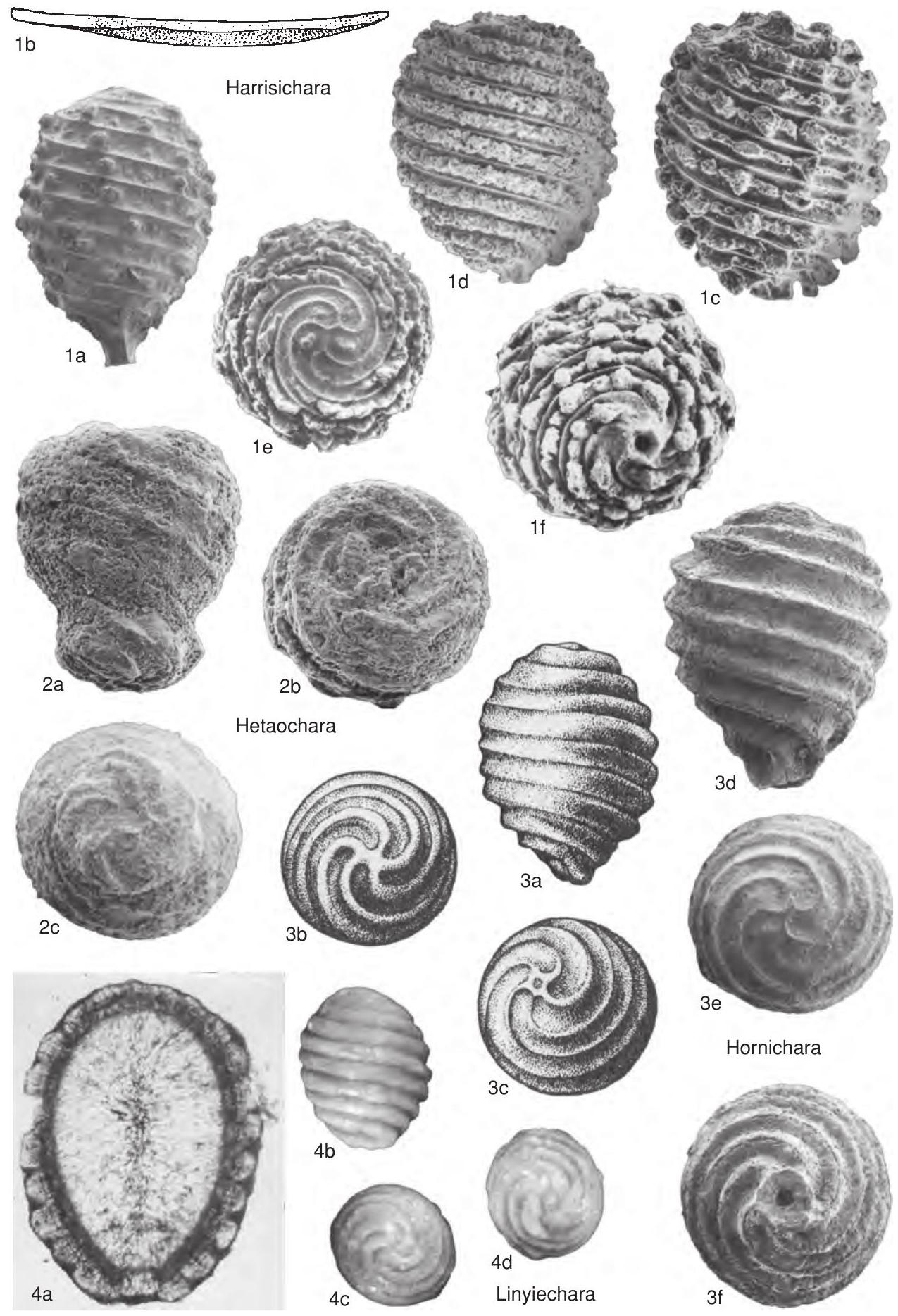Welcome to the Treatise on Invertebrate Paleontology!
Please enter a genera name to retrieve more information.

Harrisichara
Classification
Phylum:
Charophyta
Class:
Charophyceae
Order:
Charales
Suborder:
Charineae
Family:
Characeae
Subfamily:
Charoideae
Formal Genus Name and Reference:
Harrisichara GRAMBAST, 1957, p. 347
Type Species:
Chara vasiformis Reid & GROVES, 1921, p. 185, pl. IV, 13, OD
Images
(Click to enlarge in a new window)
Fig. 67,1a. *H*. vasiformis (Reid & Groves) Grambast, upper Eocene, United Kingdom, lateral view, ×50 (Feist-Castel, 1977a, pl. 21, 1), Fig. 67,1b-f. *H*. tuberculata (Lyell) Grambast, lower Oligocene, United Kingdom, b, basal plate, ×300 (Grambast, 1957, text-fig. 2b), c, neotype, lateral view, spirals with nodules, d, lateral view, spirals with continuous crest, ×40 (Feist-Castel, 1977a, pl. 21, 5, 4), e, apical view, CF.1585-2, f, basal view, CF.1584-2, ×40 (new)
Synonyms
Geographic Distribution
Belgium, France, Germany, United Kingdom, Spain, China, India, Canada, USA, Peru
Age Range
Beginning Stage in Treatise Usage:
Upper Cretaceous, Paleogene (Paleocene) -- [Occurrence of this genus in the Upper Cretaceous is questionable, as H. cretacea KARCZEWSKA & ZIEMBINSKA-TWORZYDLO, 1970, and H. margaritata Z. WANG, 1978b, do not have the basal projection characteristic of Harrisichara.]
Beginning International Stage:
Danian
Fraction Up In Beginning Stage:
0
Beginning Date:
66.04
Ending Stage in Treatise Usage:
Paleogene (lower Oligocene)
Ending International Stage:
Rupelian
Fraction Up In Ending Stage:
100
Ending Date:
23.04
Description
Gyrogonite subovoidal, apex truncated or broadly rounded, base forming narrow, projecting cone or columnar shaped, spirals generally with tubercles or crests, ornamentation interrupted at periphery of apex. Basal plate very thin, about ten times as wide as high. Size small to large.
References
Museum or Author Information
Classification
Phylum:
Charophyta
Class:
Charophyceae
Order:
Charales
Suborder:
Charineae
Family:
Characeae
Subfamily:
Charoideae
Formal Genus Name and Reference:
Harrisichara GRAMBAST, 1957, p. 347
Type Species:
Chara vasiformis Reid & GROVES, 1921, p. 185, pl. IV, 13, OD
Images
(Click to enlarge in a new window)
Fig. 67,1a. *H*. vasiformis (Reid & Groves) Grambast, upper Eocene, United Kingdom, lateral view, ×50 (Feist-Castel, 1977a, pl. 21, 1), Fig. 67,1b-f. *H*. tuberculata (Lyell) Grambast, lower Oligocene, United Kingdom, b, basal plate, ×300 (Grambast, 1957, text-fig. 2b), c, neotype, lateral view, spirals with nodules, d, lateral view, spirals with continuous crest, ×40 (Feist-Castel, 1977a, pl. 21, 5, 4), e, apical view, CF.1585-2, f, basal view, CF.1584-2, ×40 (new)
Synonyms
Geographic Distribution
Belgium, France, Germany, United Kingdom, Spain, China, India, Canada, USA, Peru
Age Range
Beginning Stage in Treatise Usage:
Upper Cretaceous, Paleogene (Paleocene) -- [Occurrence of this genus in the Upper Cretaceous is questionable, as H. cretacea KARCZEWSKA & ZIEMBINSKA-TWORZYDLO, 1970, and H. margaritata Z. WANG, 1978b, do not have the basal projection characteristic of Harrisichara.]
Beginning International Stage:
Danian
Fraction Up In Beginning Stage:
0
Beginning Date:
66.04
Ending Stage in Treatise Usage:
Paleogene (lower Oligocene)
Ending International Stage:
Rupelian
Fraction Up In Ending Stage:
100
Ending Date:
23.04
Description
Gyrogonite subovoidal, apex truncated or broadly rounded, base forming narrow, projecting cone or columnar shaped, spirals generally with tubercles or crests, ornamentation interrupted at periphery of apex. Basal plate very thin, about ten times as wide as high. Size small to large.
